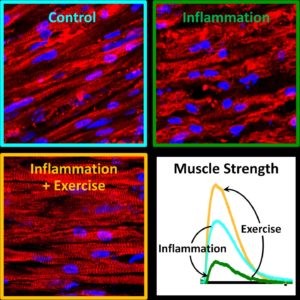Have you ever had one of those situations in life where somebody asks you a question of why something is and you can't put into words the explanation. For example, imagine a young toddler asking why is the sky blue? What would you say? How would you explain it? It's something we know to be true but hard to put into words. The same could be said for the benefits of exercise. We have known for a while that exercise helps with inflammation. But we didn't know which cell type(s) were involved? And could this help maintain strength? A research team at Duke University has been looking to answer this question. Specifically they wanted to see how effectively muscle cells would be at warding of chronic inflammation. This is different from acute inflammation that results from a specific episode such as a sprained ankle. When we roll an ankle playing pick up basketball there is an immune response to clear away cellular debris and helps the tissue heal. Other times inflammation can extend over long periods of time causing damage and weakening tissues i.e. rheumatoid arthritis and sarcopenia. This type of chronic inflammation induces muscle atrophy. Exercise can counter these negative side effects. The researchers were able to engineer muscle cells in-vitro i.e. in a petri dish. These cells were then exposed to interferon gamma for seven days. We normally see this chemical messenger elevated in muscle cells of those with chronic inflammation. After the seven day period of exposure to interferon gamma, to induce a situation of chronic inflammation, the researchers then stimulated the muscle cells electrically to make them contract. What they found was that the muscle cells that exercised i.e. that were electrically stimulated, did not show the effects of chronic inflammation. With long term inflammation, i.e. chronic...
